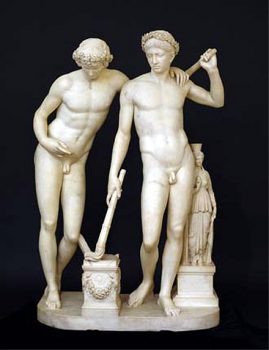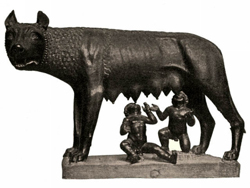Archive by Author
Roman mythology III Posted by leire on May 11, 2012
Religious festivities The Roman religious calendar reflected Rome’s hospitality to the cults and deities of conquered territories. Originally there were few Roman religious festivals. Some of the oldest survived until the end of the pagan empire, preserving the memory of the fertility and propitiatory rites of a primitive agricultural people. However they introduced new festivities…
Roman mythology II Posted by leire on May 8, 2012
Inclusion of other deities Roman primitive religions were modified both by the addition of new beliefs in later times, and for the assimilation of a great part of Greek mythology. Thus, Roman religion was consolidated before the start of the literary tradition, therefore, the early Roman writers who wrote about their religion were unaware of…
Roman mythology I Posted by leire on Apr 30, 2012
Roman mythology meets the beliefs, rituals and other practices pertaining to supernatural realm that ancient Roman people held or did since the ancient period until Christianity absorbed definitely the religions of the Roman Empire in the early Middle Ages. PRIESTS The Roman religion was very ritualistic and had many priests in charge of the rites…
Relative, interrogative-indefinite & other pronouns Posted by leire on Apr 26, 2012
Relative pronouns Singular Plural Masculine Feminine Neuter Masculine Feminine Neuter Nominative qui quae quod qui quae quae Accusative quem quam quod quos quas quae Genitive cuius quorum quarum quorum Dative cui quibus Ablative quo qua quo quibus The relative pronoun’s only function is the phoric, as it always refers to the antecedent, with which…
Phoric & emphatic pronouns Posted by leire on Apr 23, 2012
Phoric pronouns Singular Plural Masculine Feminine Neuter Masculine Feminine Neuter Nominative is ea id ei (ii) eae ea Accusative eum eam id eos eas ea Genitive eius eorum earum eorum Dative ei eis (iis) Ablative eo ea eo eis (iis) As the name suggests, its main function is the phoric: it is used…
Possessive & demonstrative pronouns Posted by leire on Apr 12, 2012
Possessive pronouns One holder Several holders 1st person meus, -a, -um noster, nostra, nostrum 2nd person tuus, -a, -um uester, uestra, uestrum 3rd person (reflexive) suus, -a, -um Its main function is the morphemic: they express the category of person and number. The reflexive possessive suus, -a, -um has also a phoric function…
Pronominal morphology & Personal pronouns Posted by leire on Apr 9, 2012
What are pronouns? Traditionally pronouns are defined as words that are used in place of the name. However, this definition is unsatisfactory, in a phrases like: I will go to the movies tomorrow What name replaces “I“? It is obvious that it does no replace any name. ‘I‘ is a first-person morpheme that indicates the…






